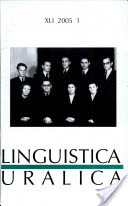Zur deverbalen substantivischen Konversion im Estnischen
Verb-to-Noun Conversion in Estonian
Author(s): Silvi VareSubject(s): Language and Literature Studies
Published by: Eesti Teaduste Akadeemia Kirjastus
Keywords: Estonian; conversion; derivation
Summary/Abstract: In Estonian, conversion as a change in word class without introducing a derivational suffix applies, first and foremost, to mutual convertibility of verbs and nouns, e.g. rohi ‘grass’ > rohi/ma ‘to weed’ (-ma is an infinitive marker) or ravi/ma ‘to cure’ > ravi ‘treatment’. The article provides a brief survey of verb-to-noun conversion, done mainly on the basis of formal characteristics. The focus lies on the propensity for conversion as manifested in verbs with different structures (simple bases, derivatives, compounds), thus specifying the principal phonological and morphological prerequisites that determine the possibility and productivity of verb-to-noun conversion. It appears that in a general case the base of conversion is a simple base, while a derivative can be converted only on certain specific conditions. At that, the grammatical peculiarities of Estonian as a Finno-Ugric language engender some interpretational issues, while the synchronic vs. diachronic aspects should also be taken into account. As morphonological alternation of word stems has a vital role in both inflection and derivation it can certainly not be overlooked in conversion. Thus Estonian conversion does not only involve fully identical stems, but also phonetic variance of a definite kind. The study is synchronic, based on the latest edition of the Estonian orthological dictionary (ÕS 1999).
Journal: Linguistica Uralica
- Issue Year: XLI/2005
- Issue No: 1
- Page Range: 30-42
- Page Count: 13
- Language: German

